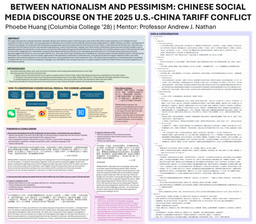While all Laidlaw Scholars will be presenting their research at the Columbia Undergraduate Research Symposium in the fall, what are the more immediate expectations that you have for your research? Are you writing a paper? Will your research be part of a larger scientific study? Do you hope to produce an annotated bibliography that you reflect on down the line? Is your research now the first phase of a project you’ll continue to work on throughout the year, and/or next summer? Now that we are nearing the one month mark of the program, please write about your expectations for your research.
I anticipate that my research will culminate in a formal academic paper that critically analyzes Chinese citizens’ online discourse in response to recent U.S. tariffs. My goal is to uncover how grassroots Chinese netizens are engaging with, interpreting, and reacting to key developments in U.S.-China trade relations, and to explore what these discourses reveal about broader trends in public sentiment and political consciousness. The paper will include a comprehensive literature review that situates my analysis within relevant theoretical frameworks in media studies, political communication, and international relations.
Although this six-week research period provides the foundation for my work, I see it as only the first phase of a longer-term project. I plan to continue refining and expanding the research over the course of the academic year, with the intention of completing a polished paper before September. Additionally, I hope to develop an annotated bibliography and a set of working notes that I can revisit as I pursue related topics in future research or coursework.
Why does your research matter? Explain the significance of the question you are investigating, and why you are interested in it.
This research matters because it offers a bottom-up perspective on U.S.-China relations—one that foregrounds the voices and interpretations of everyday Chinese internet users rather than focusing exclusively on elite actors, official media, or state policy. International relations are not shaped solely by diplomats or government officials; they are also constructed and mediated through public discourse, online narratives, and the cultural dimensions of soft power.
Moreover, the study of Chinese social media discourse provides a unique lens into how public opinion is shaped, constrained, and expressed in an environment of stringent state surveillance and censorship. Despite these limitations, users often find creative and subtle ways to navigate and even resist ideological boundaries. Observing these patterns sheds light not only on the state-society relationship in China but also on how global political tensions are filtered through localized digital cultures. My interest in this project stems from a broader desire to understand the human and discursive dimensions of international conflict, particularly in an era where social media increasingly shapes political reality.


Please sign in
If you are a registered user on Laidlaw Scholars Network, please sign in
I think your research is really important. Because of how censorship works in China, there is a clear divide between the internet culture in China and the larger global culture. A lot of people outside China don’t have a clear view of what everyday citizens actually think or say online. The platforms people use and the way they engage with current events are very different from what most of the world is used to.
To me this project feels like a solid step toward making that world more accessible and better understood. Looking at how people in China react to U.S. tariffs could give us a clearer sense of public opinion that isn’t filtered through state media or Western assumptions.